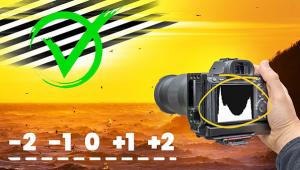HP’s Designjet Z3100; A Large Format Pigment Ink Printer Page 2
Or, if you plan to print in grayscale, the Gray Balance tab gives you total control over tonal range, something I haven't seen at this level in any other printer driver, and exceeds the Advanced Black & White mode available in the newer Epson UltraChrome K3 printers.
 |
Note: HP is currently working on a plug-in for Photoshop
that will make printing a one-stop operation, similar to what is available for
the B9180 printer. This plug-in wasn't available when I wrote this review.
I found the speed of the Z3100 a pleasant surprise, especially when viewing
the quality of prints. I found speeds to be about 15 percent faster than the
Epson Stylus Pro 7800, even though I was printing at a higher quality setting
with the HP. Compared to the Canon imagePROGRAF iPF5000, the Z3100 is about
10 percent slower. I haven't had direct experience with the larger Canon
printers, but I would expect this speed difference to be similar there.
 |
To track use and expenses, the built-in web server gives you plenty of information,
including print jobs, ink use, paper type used, and more. For anyone producing
prints for sale, this level of reporting makes it possible to accurately price
work and track supplies.
Based on my initial use of the printer, ink costs are very reasonable. On average,
the printer uses 2.12ml of ink per square meter of paper. At the retail price
of $75 per cartridge, this works out to about $1.20 per square foot for ink.
Buying ink in the available two pack reduces this cost to about 93 cents per
square foot.
 |
The web server also includes information on print head status, full access
to online support and documentation as well as a way to reorder supplies when
needed. If you've used a pigment printer in the past, you've likely
experienced the problem of clogged heads. HP recommends leaving the printer
turned on at all times which will allow it to perform nozzle checks and cleaning
as needed. This significantly reduces the amount of ink used (and wasted).
Print Quality
Print quality is the main objective for most of us. It doesn't matter
if the printer has four colors or 12--if the print looks good, we're
happy. The Z3100 doesn't disappoint. Color prints have a slightly larger
gamut than the Epson I'm used to, especially in the greens and blues,
thanks to the inclusion of primary inks in these colors. Black and white prints
are more neutral than anything I've ever done without using an additional
RIP like ImagePrint. And, along with excellent neutrality, there is no--that's
right no--metamerism, or shift in color tone, when going from one light
source to another. Dynamic range is better, too, with more detail in deep shadow
areas than I've seen in an inkjet print, exceeding the Canon by a small
margin. When printing on photo papers (gloss, luster), the Z3100 uses three
blacks, while on fine art papers all four blacks are used, essentially giving
you a quadtone printer.
Along with the Z-series printers, HP has brought out a full line-up of media,
some of it made in conjunction with Hahnemühle. The Smooth Fine Art feels
very much like the Hahnemühle Photo Rag, but is a brighter white that I
find excellent for black and white and color work.
Conclusion
If you're serious about printing, the Z series is impossible to beat.
Canon and Epson have a strong competitor now, which is great for all of us.
The gloss enhancer included with the Z3100 makes it possible to print outstanding
gloss and satin prints with no bronzing or gloss differential to detract from
the print. And, with an archival life of 200 years, our work will be around
long after we're gone. With the frugal ink use, ability to print quadtone
black and white, and very little ink waste due to cleaning, the Z3100 is an
excellent option for anyone interested in printing on a variety of media types.
The initial price tag may throw some off, but given the inclusion of a spectrophotometer,
the price is very reasonable. Although I have Epson and Canon printers available
as well, this has become my primary printer now, especially for work on photo
papers where the gloss enhancer sets the Z3100 apart.
For more information, contact Hewlett-Packard Company, 3000 Hanover St., Palo
Alto, CA 94304; (650) 857-1501; www.hp.com.
- Log in or register to post comments

































